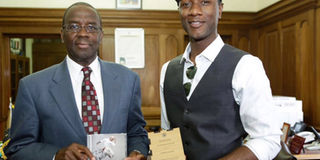Nktest! What did the CJ just call the Supreme Court?

When the American hip hop performer, Aloe Blacc, visited him at the Supreme Court on April 9, the CJ sent out the following tweet: “Nikiwa na mwanaharakati wa Hip Hop kutoka Marekani @aloeblacc baada ya kuni visit afisini kwa mine mahakama ya top.?” PHOTO| COURTESY
What you need to know:
The importance of the language that the CJ chooses to represent his office becomes even more significant when one takes into account that the court speaks two languages, English and Kiswahili.
But, from a public interest perspective, it is important to consider that millions of young people across the country look up to Dr Mutunga as a role model, not least because he is also a man of letters, a cultural icon, a transformational leader and an influencer.
One of the functions of language is to act as the carrier of what polite society calls “social graces”. It sets the rules for etiquette that society expects, especially from its eminent members.
Taken to its logical conclusion, this cultural tenet basically means that holders of high office are expected to calculate the way in which they use language to present and represent themselves in the public sphere.
That is why it was disconcerting to find the Chief Justice, Dr Willy Mutunga, calling the Supreme Court “afisini kwa mine mahakama ya top” on Twitter, yet he is the President of that venerated public institution.
When the American hip hop performer, Aloe Blacc, visited him at the Supreme Court on April 9, the CJ sent out the following tweet: “Nikiwa na mwanaharakati wa Hip Hop kutoka Marekani
@aloeblacc baada ya kuni visit afisini kwa mine mahakama ya top.?”
YOUNG KENYANS
It is possible that Dr Mutunga, who has announced that he will be retiring from that high office in two months, was trying to sound like what Jazz maestro Miles Davis used to call “hip cats”.
It is also possible that he was trying to connect with young Kenyans who associate with music, seeing that he was hosting a performer in his office.
It is also possible that he tried too hard to look and sound cool considering that the occasion was not a private meeting between two card-carrying members of the counter-culture engaging each
other in their private capacities.
This was a meeting hosted by a high-ranking public officer in the hallowed office of the President of the Supreme Court. Indeed, both were appropriately dressed for the occasion.
In such a setting, therefore, the rules that govern language in public office ought to apply. The Chief Justice is presumably the first among equally learned friends. That, surely, must count for
something.
The importance of the language that the CJ chooses to represent his office becomes even more significant when one takes into account that the court speaks two languages, English and Kiswahili.
ROLE MODEL
But, from a public interest perspective, it is important to consider that millions of young people across the country look up to Dr Mutunga as a role model, not least because he is also a man of letters, a cultural icon, a transformational leader and an influencer.
As such, when he tweets in his official capacity, he would achieve far-reaching public good by simply observing the rules of language and decorum that come with his office.
It is, therefore, an assault on linguistic sensibilities for the CJ to call the highest court in the land “mahakama ya top” because this offends the rules of language and deportment at so many levels even if one chooses to turn a blind eye to his sins of punctuation.
In fact, it sends the impression that it is legitimate to baptise high public offices with informal monickers; that the rules of linguistic engagement can be bent at will; and that it is honky dory for young people to go forth and do likewise.
Given our cultural context — which is characterised by diminishing competence in language skills compounded by a waning reading culture — the tweet does more injustice in the context of public discourse and hardly any good even to the CJ himself.
Interestingly, Aloe Blacc, despite being an artiste and a “mwanaharakati” in the eyes of Dr Mutunga, tweets with impeccable finesse and his language is polished on Twitter and even in television interviews.
It is also worth noting that when he appeared on Churchill Live on Sunday night, an attempt by MC Jessie to draw an African-American “tweng” from him was unsuccessful although he was in a comedy show.
There are those who will say, and it is a valid view, that Dr Mutunga is a breath of fresh air and a revolutionary.
True. However, even when he was one of the poster boys of the political counter-culture under the Moi administration, he refrained from resorting to informal language though he was a private
citizen and the luxury of choosing his language was available to him. In fact, his book, Constitution-Making from the Middle (Civil Society and Transition Politics in Kenya) is one of the most
readable and highly-erudite treatises on the subject.
INFLUENCE
If he played by the rules of linguistic engagement when he was mobilising the counter-culture to political action and national transformation, why allow this competence to atrophy when he is now
President of the Supreme Court and occupies a position of considerable influence that he could use to encourage reading and learning and to edify language as a learned judge?
One more thing. The most important role of the court system is to ensure that all citizens respect the basic rule that “all rules are rules”.
This is the foundation of social order. In fact, it is enshrined in the Kenya Constitution as “the rule of law” in the preamble. Language is the vehicle that carries all other rules and distils their complexity in a code that every citizen can easily internalise.
As such, for the Chief Justice to break the fundamental rules of language, while addressing himself from his high office and as a public officer, is to negate the very principle that all rules are rules.
Indeed, if his peers were to borrow a moral lesson from his tweet, they would have no qualms observing the rules of contractual obligation and ethical conduct in the breach.
Ng’ang’a Mbugua is a journalist and creative writer





